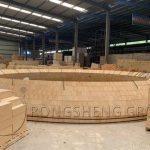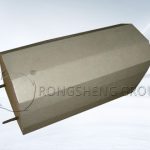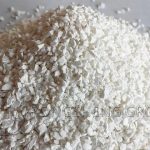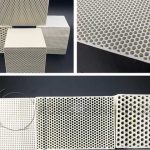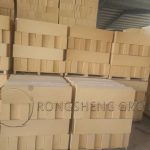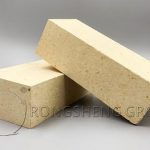Cordierite refractory brick is a versatile and durable material that is widely used in high-temperature applications. One of its most valuable properties is its excellent thermal shock resistance, which makes it an ideal choice for use in environments where rapid temperature changes are common.
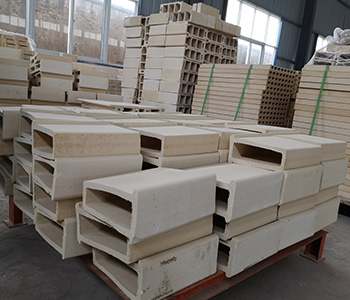
Benefits of Cordierite Refractory Brick for Thermal Shock Resistance
Thermal shock occurs when a material undergoes sudden and significant changes in temperature, leading to cracking, spalling, or even complete failure. In high-temperature applications, such as in furnaces, kilns, and reactors, thermal shock is a common problem that can result in significant downtime, maintenance costs, and lost productivity.
Cordierite refractory brick, however, can withstand rapid temperature changes without breaking or degrading, thanks to its unique composition and structure. Cordierite is a magnesium-aluminum silicate mineral that is formed at high temperatures and has a low coefficient of thermal expansion, which means it does not expand or contract significantly when exposed to changes in temperature.
The porous and interconnected structure of cordierite refractory brick also helps to dissipate thermal shock energy and prevent cracks from propagating. The tiny pores and channels in the material act as stress relief points, absorbing the energy of the shock wave and reducing its impact.
Furthermore, cordierite refractory brick is chemically stable and resistant to attack by many acids, bases, and other corrosive substances. This makes it a reliable choice for use in harsh environments where other materials might fail.
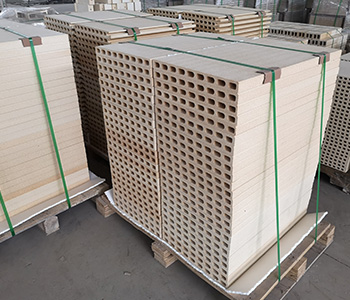
The benefits of cordierite refractory brick for thermal shock resistance can be seen in a wide range of industrial applications. For example, it is commonly used in the production of steel, where it is used to line blast furnaces, ladles, and other high-temperature equipment. Cordierite refractory brick is also used in the glass and ceramic industries, where it is used to line kilns, ovens, and other high-temperature processing equipment.
In addition to its thermal shock resistance, cordierite refractory brick offers other benefits as well. It is lightweight, easy to install, and has a long service life. It is also an environmentally friendly material, as it is made from natural minerals and can be recycled at the end of its life.
In conclusion, cordierite refractory brick is a versatile and durable material that offers excellent thermal shock resistance, making it an ideal choice for use in high-temperature applications. Its unique composition and structure make it resistant to cracking and spalling, while its chemical stability and corrosion resistance make it a reliable choice for use in harsh environments. For these reasons, cordierite refractory brick is a popular choice in a wide range of industrial applications and is sure to continue to be an important material for many years to come.
The Versatility of Cordierite Refractory Brick in High-Temperature Applications
Cordierite refractory brick is a versatile material that is well-suited for use in high-temperature applications. Its unique combination of physical and chemical properties makes it an ideal choice for a wide range of industrial processes, from steel production to glassmaking.
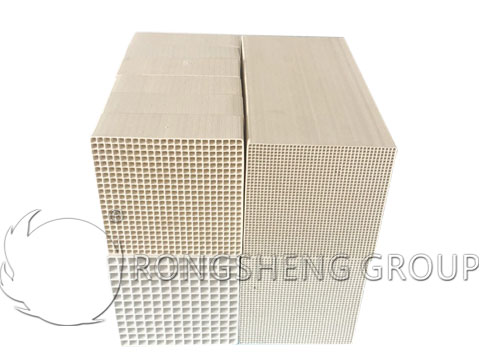
One of the key benefits of cordierite refractory brick is its ability to withstand high temperatures without degrading or losing its structural integrity. This is due to the material’s low thermal expansion coefficient, which means it does not expand or contract significantly when exposed to changes in temperature. This property makes it a reliable choice for use in furnaces, kilns, and other high-temperature equipment.
Cordierite refractory brick is also chemically stable and resistant to many acids, bases, and other corrosive substances. This makes it an ideal choice for use in harsh environments where other materials might fail, such as in the production of chemicals or in the processing of metals.
Another benefit of cordierite refractory brick is its ability to resist thermal shock. This occurs when a material undergoes rapid and significant changes in temperature, which can cause it to crack or fail. Cordierite’s porous and interconnected structure helps to dissipate thermal shock energy and prevent cracks from propagating.
The versatility of cordierite refractory brick can be seen in a variety of industrial applications. In the steel industry, it is commonly used to line blast furnaces, ladles, and other high-temperature equipment. In the glass industry, it is used to line kilns and ovens used in the production of glass products. It is also used in the production of ceramics, where it is used to line kilns and other high-temperature processing equipment.
Cordierite refractory brick is also a lightweight and easy-to-install material, which makes it a cost-effective choice for many industrial processes. Its long service life and ability to withstand harsh environments further enhance its value for industrial applications.
In conclusion, cordierite refractory brick is a versatile and reliable material that offers a wide range of benefits for high-temperature applications. Its ability to withstand high temperatures, resist thermal shock and resist corrosion make it an ideal choice for use in a variety of industrial processes. Its versatility and cost-effectiveness further enhance its value, making it a popular choice for many applications across industries.



